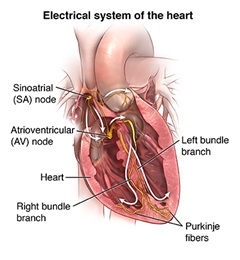When to Evaluate Heart Murmurs
Featured Expert:
Detecting a Heart Murmur in Adults
When blood flows normally through the heart valves, it makes a two-beat “lub-lub” sound. With a murmur, the blood is not flowing normally through the heart valves, and your physician may hear through a stethoscope any of a variety of “swishing” sounds that can differ in volume, pitch, and duration.
“Where does the murmur reach its peak of intensity? This information can help guide a cardiologist as to whether the murmur is innocent or of more concern,” says Dr. Nisha Chandra-Strobos, chief of cardiology at Johns Hopkins Bayview Medical Center. “In a crescendo murmur for example, the sound whooshes up and then suddenly stops. So just from the way it sounds, you can often draw conclusions as to the type and seriousness of the murmur.”
Murmurs can be caused by a heart valve abnormality or a defect in the muscular structure of the heart. In a few cases, it can be present from birth because of an anatomical malformation. Murmurs detected in children can be innocent or related to a congenital heart defect, and should be referred to a pediatric cardiologist. Pediatric murmurs are not the focus of this article.
Differentiating whether a heart murmur is innocent or requires follow-up by a cardiologist depends on the symptoms, the timing and characteristics of the murmur, and the general condition of the patient.
Types of Heart Murmurs
Heart murmurs generally fall into two categories: innocent and abnormal.
- Innocent heart murmurs – can reflect a more rapid blood flow through the heart valves and require no further attention when detected in a healthy heart. Innocent murmurs can occur:
- After strenuous activity or exercise
- If you’re lacking healthy red blood cells due to anemia
- During pregnancy, when the heart needs to pump extra blood for the baby
Most innocent murmurs happen when the heart muscle is contracting, and are classified as systolic heart murmurs.
- Abnormal heart murmurs – can indicate a defect in the structure of the heart valve, or other heart valve abnormality present since birth or occurring later in life. Abnormal heart murmurs can also be caused by the narrowing and hardening of heart valves, which happens as we age.
Heart murmurs often don’t carry any symptoms at all and are only discovered through the physician’s ears during a stethoscope exam. When there are symptoms—such as shortness of breath, dizziness, or blackouts—they’re often due to an underlying cause, such as damage to the heart valves.
Evaluating and treating a heart murmur that needs attention.
The first step in evaluating a heart murmur once it is detected is to see a cardiologist, who may:
- Perform a detailed review of your medical history
- Conduct a clinical examination identifying unique characteristics of the murmur that may help determine severity
- Administer an echocardiogram (sonogram of the heart)
- Put the patient through further testing if necessary
“You don’t treat the murmer, you treat what’s causing the murmur,” says Chandra-Strobos. “Sometimes, the cause of the murmur is due to a leaky valve, in which case medication can help. However, there are some situations where the valve is badly damaged. Medication may help temporarily stabilize things, but the valve might need to be replaced surgically.”







